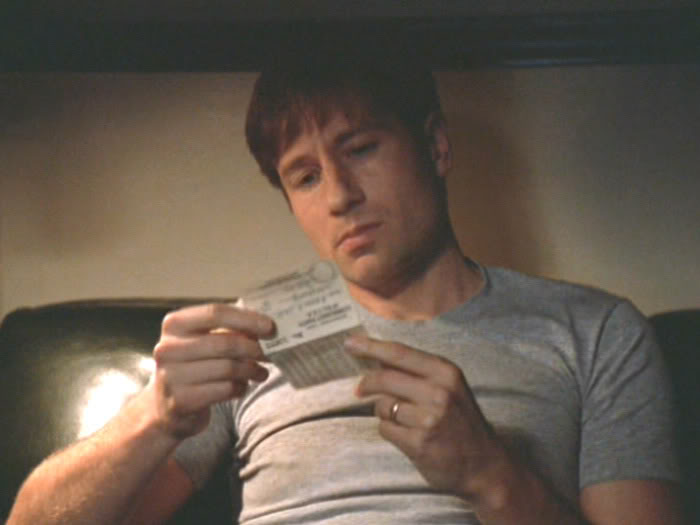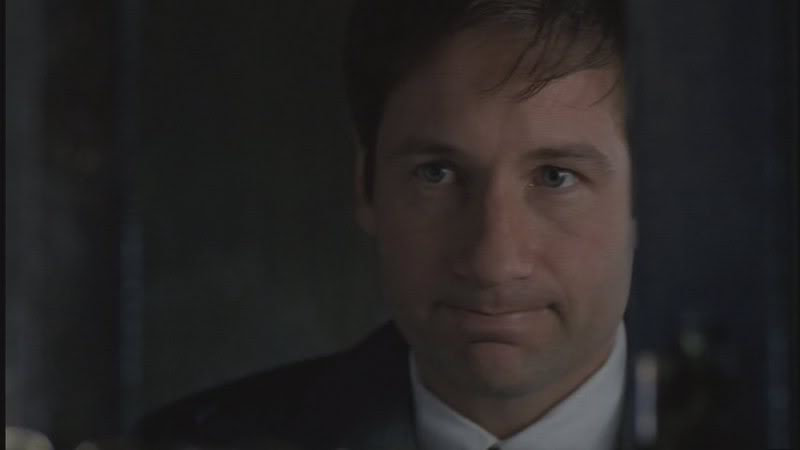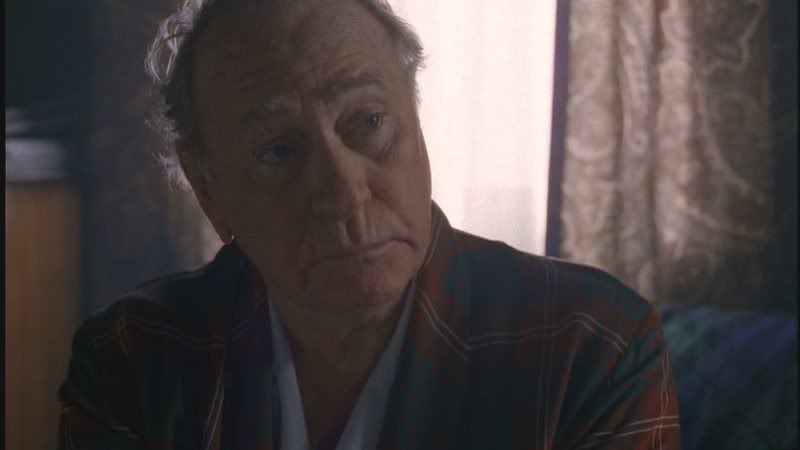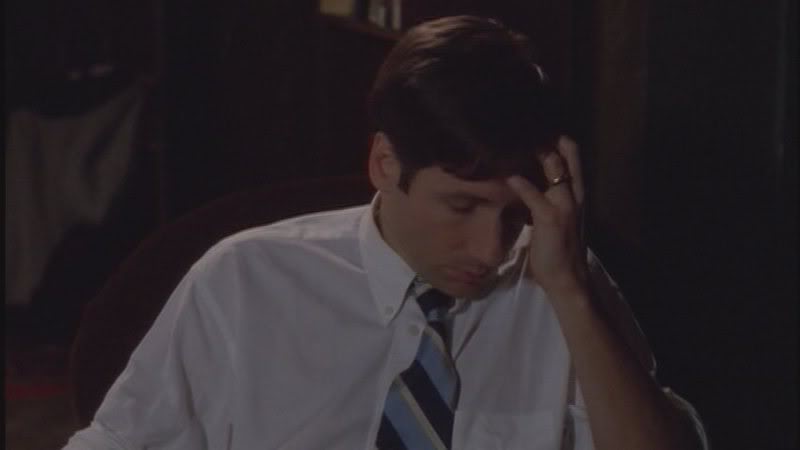CTP Episode of the Day - 10.19.06 - Travelers
Today's Cherished Episode: Travelers (5x15)
Original Air Date: March 29, 1998
Written By: John Shiban & Frank Spotnitz
Directed By: Bill Graham
One year before reopening the X-Files, young Agent Fox Mulder investigates a bizarre murder. The answers he seeks lie in the not-so-distant past: during the Red Scare of the 1950s.




DALES: What is this?
BAHNSEN: The deposition that names Edward Skur and these other two men as communists.
DALES: It's all censored.
BAHNSEN: By the committee to protect the identity of the witness.
DALES: There was no witness. This whole thing's been manufactured. Edward Skur is no communist. Neither are these other two men, Gissing and Oberman. I wanna see their files, Gissing and Oberman.
BAHNSEN: I already checked. They're missing but I recognize one of these names. It's an X-file.
DALES: An "X-file"?
BAHNSEN: Yes, unsolved cases. I file them under "X."
DALES: Why don't you file them under "U" for "unsolved"?
BAHNSEN: That's what I did until I ran out of room. Plenty of room in the "X's."
DALES: Who decides when a case gets an "X"?
BAHNSEN: The director's office. It's, uh ... it's kind of a dead end. No one's supposed to see them, but it makes for interesting reading.
Some "Travelers" Tidbits & Musings:
-- Joseph McCarthy was a Republican Senator from Wisconsin between 1947 and 1957. Between 1950 and 1954, McCarthy became noted for aggressively investigating claims that there were Communist and Soviet spies and sympathizers inside the Federal Government. Beginning in the late 1940s, as the Cold War escalated between the U.S. and the Soviet Union and China, the U.S. went through a period of intense anti-Communist tensions and suspicion. Many thousands of individuals were suspected of being Soviet spies, Communists, or Communist sympathizers. The issue of Communist influence and espionage had been a subject of concern for years in national politics, and this concern increased sharply after World War II. McCarthy became the most visible public face of this era of anti-Communism, and as a result, the term McCarthyism was coined (by The Washington Post) to describe and condemn his practices.
-- Title -- Fellow "Travelers" were Americans who were sympathetic to the Communist cause during the McCarthy era.
-- A complex and challenging episode even in a series that specializes in them, "Travelers" was in large part a tribute to one man. His name was Howard Dimsdale -- a talented screenwriter victimized by the vicious anti-Communist blacklist of the 1950s. Unable to obtain writing assignments after the witch hunts began, he worked for several years in exile in Europe. He also wrote Hollywood movies, secretly, under the pseudonym Arthur Dales.
-- Dimsdale died in 1991. During the latter part of his life, Dimsdale was a respected writing teacher and mentor at the American Film Institute in Los Angeles. Two of his students -- and admirers -- were X-Files co-executive producer Frank Spotnitz and co-producer John Shiban.
-- "Howard Dimsdale was a wonderful man," said Shiban, "who told incredible stories about that period, which was a part of American history we'd always been interested in." Early in The X-Files's fifth season the two writers/producers decided that the paranoia, treachery, and double-dealing of that dark era would fit nicely into The X-Files ethos. And so they wrote "Travelers" and its main character as a tribute to their former teacher.
-- Spotnitz said, "We wondered 'What if the witch-hunt was actually a smoke screen to conceal something else?'" Once into the story, he added, he and his writing partner realized that (1) FBI Agent Dales's dilemma when ordered to go against his principles and arrest an innocent man neatly mirrored the pressure on blacklisted individuals to "name names" and save their own skins; and that (2) setting most of the episode in the distant past would open up new opportunities to trace the roots of both Fox Mulder and the X-Files. They'd also solved a tricky scheduling problem. During "Travelers's" eight-day March production schedule, both David Duchovny and Gillian Anderson were needed in Los Angeles for reshoots on The X-Files movie.
-- Accordingly, a more-thorough-than-usual search was launched to find an actor who would hold on to the viewers in their absence. At virtually the last minute, the part of Young Dales was given to Frederic Lane, an experienced TV and movie actor whose credits included Dallas, Mancuso, FBI, and the megahit Men in Black.
-- The episode's major casting coup, of course, was in convincing 74-year-old Darren McGavin to take the role of Arthur Dales circa 1989. Over the previous five years, McGavin -- whose 1974 drama Kolchak: The Night Stalker was a major creative influence on the teenage Chris Carter -- had turned down numerous invitations to guest-star on The X-Files (including the role of Mulder's father in Season 2). The question of why, exactly, he accepted this offer produced only smiles and shrugs among the show's casting and production staff -- plus the news that McGavin was subsequently signed to reprise his role in several episodes during Season 6.
-- After this, all that remained was to create a polished, convincing period movie in less time than was considered humanly possibly. Costume designer Jenni Gullett and her staff scrambled frantically to rent, borrow, or sew all the vintage '50s clothing they needed; picture car coordinator Nigel Habgood rounded up as many 1952 and 1953 sedans as he could find; and art director Gary Allen perused old articles about the FBI in National Geographic magazine to help him recreate J. Edgar Hoover's headquarters of the time period.
-- "And then we did the bomb shelter, which was easy," said Allen. "Because when I was growing up in Southern California my father was a contractor and when he built them he took me along to help."
-- Special effects makeup supervisor Toby Lindala constructed both the fifties-ish monster and the elastic facial appliance that allowed it to crawl out of the tormented Edward Skur's mouth. A Vancouver restaurant called the Meat Market was turned into the Hoot Owl; and in the post-production process a special bleaching process was used to give the final film print a somewhat mellowed, vintaged appearance.
-- The result, said both writers, was a finished product that they felt did justice to both the painful controversies of the 1950s and the contemporary TV series they worked for. But alas, not everyone was completely satisfied.
-- Frank Spotnitz said, "We hired a retired FBI agent to serve as a technical advisor on the script. This was a gentleman who'd been with the Bureau for 20 or 30 years, and he was very offended by our script. He was angry that we would even suggest that J. Edgar Hoover -- whom he still called 'Mr. Hoover' -- would be involved in any of the plots, or take any of the positions that he took in the script. Then he told me that he'd never actually seen our show. 'But if this is the type of story that you're telling,' he told me, 'I can't imagine that it would be very popular.'"
-- This was Bill Graham's first X-Files directing assignment since Season 1. He also directed "Space" and "E.B.E."
-- 11/21 - the date Mulder first meets Arthur Dates is 11/21/1990. 11/21 is Chris Carter's wife's birthday.
-- Red-baiting U.S. Senator Joseph McCarthy, who died of alcoholism in 1957, was nicknamed "Tailgunner Joe" because of his service in the Army Air Corps during World War II. (Clyde Bruckman himself -- Peter Boyle -- played Joseph McCarthy in a 1977 TV movie about the Senator's life titled Tailgunner Joe. Boyle received his first Emmy nomination for the role.)
-- J. Edgar Hoover's paranoid rant to Arthur Dales about the Communist menace was taken almost verbatim from a speech by Senator McCarthy.
-- Footage of Joseph McCarthy was recently used in the 2005 movie Good Night and Good Luck about Edward R. Murrow and the fall of McCarthy, starring David Strathairn as Murror and George Clooney as Fred Friendly, co-producer of Murrow's See It Now TV documentary series. (One of the most prominent attacks on McCarthy's methods was an episode of See It Now broadcast on March 9, 1954.) Test audiences felt the actor who portrayed Joseph McCarthy was overacting; they were unaware that only archive footage of the actual Joseph McCarthy was used in the film.
-- David Fredericks, who played J. Edgar Hoover in this episode, played the same role in Season 4's "Musings of a Cigarette Smoking Man."
-- The controversial and sinister Roy Cohn, who died of AIDS in 1986, was portrayed by James Woods in the HBO movie Citizen Cohn and by Ron Leibman in the Pulitzer Prize-winning play Angels in America. David Moreland, who played the role in "Travelers," had seen both productions before creating his own version of this real-life figure.
-- In 1952 Joseph McCarthy appointed Roy Cohn as the chief counsel to the Government Committee on Operations of the Senate. Cohn had been recommended by J. Edgar Hoover, who was impressed by Cohn's involvement in the prosecution of Julius & Ethel Rosenberg in 1951.
-- In the scene where Dales is being interviewed by Cohn, Cohn's assistant stands at the back of the office and silently observes. He stands in a similar pose and behaves in a similar manner to that of the Cigarette Smoking Man during Scully's initial interview in the "Pilot." The assistant, who was never named in dialogue or in the credits, was definitely an associate of Bill Mulder at the time. Despite the fact that he was not seen smoking in this episode, many X-Philes speculated that the assistant was a young CSM.
-- "Lili Marlene," a song popular with soldiers on both sides in World War II, was sung most notably by actress Marlene Dietrich. However, the version playing in the German doctor's house -- carefully selected by a certain X-Files producer -- was attributed to a hitherto-unknown female singer. Adroit freeze-framers might be able to read the name on the record label: "Paula Rabwini." (Paul Rabwin was of course one of the producers on the show.)
-- The same record mentioned above was recorded on the "ETAP" recording label. "ETAP," a commonly used brand name in the series, was actually the name of assistant prop master Jim Pate spelled backwards (other ETAP references appeared in "Unruhe," "Small Potatoes," "Redux," and "Christmas Carol").
-- Mulder's 1989 apartment was virtually the same as his 1998 apartment -- except for the absence of a fish tank and computer.
-- Internet lines pulsed frantically on March 29 after observant fans noticed Mulder's wedding ring and cigarette habit in "Travelers." As in "Unusual Suspects," these interesting details were added by David Duchovny himself -- and in usual X-Files fashion, were never explained.
-- Mulder's awkward left-hand-through-the-hair motion may not have been solely to show off the wedding band. Keen-eyed observers noted that William B. Davis (the actor who played the Cigarette Smoking Man) made a similar gesture quite frequently; this added fuel to the fan speculation fire that Cigarette Smoking Man was Mulder's father.
-- This was the third episode in which Gillian Anderson did not appear at all (the first two were "3" and "Zero Sum").
-- The house in the teaser was also used in "Demons."
-- Oopsie! When Mulder drives up to meet Dales for the first time, his trench coat belt is hanging out his car door.
-- Agent Hayes Michel (Arthur Dales' partner) was named after the then fiancÚ of Mary Astadourian, Chris Carter's executive assistant.
-- Howard Dimsdale also got a shout-out in Fight the Future. The newspaper article Mulder reads at the end of the film (titled "Fatal Hanta Virus Outbreak in Northern Texas Reported Contained") was written by reporter Howard Dimsdale.
-- Darren McGavin (Older Arthur Dales) was a veteran and seasoned actor of stage, screen, and television, probably best remembered (especially by Chris Carter) for his role as heroic newspaper reporter Carl Kolchak. McGavin received his dramatic arts training in New York's Neighborhood Playhouse an the Actors Studio, and made his screen debut in an uncredited role in 1945's A Song to Remember. Several roles followed until he landed the key role of Louie the drug pusher in The Man With the Golden Arm (1955) and Captain Russ Peters in The Court Martial of Billy Mitchell (1955), both directed by Otto Preminger. Each of these performances showcased McGavin's versatility, and his virile good looks scored him the role of Mickey Spillane's hard-boiled private eye in Mike Hammer (1956). McGavin worked steadily in film and television in the 1960s and played Kolchak in the early 1970s. He garnered a whole new generation of fans with his portrayal of the vitriolic, buffoonish, but kind-hearted father in the delightful Christmas classic A Christmas Story in 1983.
-- In the 1990s, before playing Fox Mulder's predecessor, McGavin took on the role of Bill Brown, father of Murphy Brown, in several episodes of that popular comedy series. He received an Emmy nomination for that role in 1990. Arthur Dales was McGavin's last role; he died early this year of natural causes at the age of 83.
-- Fredric Lehne (Young Arthur Dales) had a recurring role as Marshal Edward Mars in Season 1 of Lost (he was handcuffed to Kate on the plane). Lehne has recently guest-starred on Medium, Bones, and Supernatural.
-- The part of Edward Skur was an early TV role for actor Garret Dillahunt. But he's gone on to rack up some impressive guest roles on several popular series. He played Francis Wolcott in Deadwood, Matthew Ross in The 4400, and he appeared as Jesus Christ in the critically acclaimed but short-lived NBC series, The Book of Daniel.
-- Once & Future Retreads: Fredric Lehne (Young Arthur Dales) reprised the role in "The Unnatural." Darren McGavin (Older Arthur Dales) reprised his role in "Agua Mala." McGavin was also set to reprise the role in "The Unnatural," but fell ill a few days after filming began. Dean Aylesworth (Young Bill Mulder) played that sale role in "Demons" and "Musings of a Cigarette Smoking Man." David Fredericks (J. Edgar Hoover) played that same role in "Musings of a Cigarette Smoking Man," Larsen in "Oubliette," and a Security Guard in "Blood." Mitchell Kosterman (Sheriff) was Fornier in "The List," and Detective Horton in "Sleepless" and "Genderbender." Eileen Pedde (Mrs. Skur) played Angie in "Terma." Roger Haskett (Coroner) was Deputy Tyson in "Miracle Man." Jane Perry (Dorothy Bahnsen -- the woman responsible for creating the "X" files as there was no room in the "U's") was the Day Care Operator in "Paper Hearts." J. Douglas Stewart (Landlord) as an EMT in "Leonard Betts." Peter Nicholas (FBI Agent) appeared in small roles in "Avatar" and "Piper Maru."
-- One problem with telling "flashback" stories like this is that you have to have some continuity (not something that the 1013 kids have been known to excel at). One problem with "Travelers" is that Mulder hears this story about his father being involved with grafting another species to people's insides with the help of German scientists in 1990. So why was he so shocked about his father's activities in "Paper Clip"? Like his mom, perhaps he repressed it all. < g >
-- "Travelers" is generally not considered a fan favorite, but I really didn't mind it so much. It might have been a bit out of place in Season 5, but I believe episodes like this would have worked wonderfully in Season 8 while viewers awaited Mulder's return. What a great opportunity it would have been to give us some of the X-Files history, like what really happened between CSM and Teena Mulder, how did the Syndicate members get together and decide to save the world, exactly what was Bill Mulder's role in the whole thing, why was Scully chosen to be paired up with Mulder, and some backstory on Scully's family as well (her father was in the military, after all). Of course, by Season 8, the producers had decided to scrap all the old mythology and move on; but I think a few of these flashback episodes would have been quite welcome.
-- "Travelers" was the second lowest rated episode of Season 5 (a 9.9 rating and a 15 share). Only "All Souls" was rated lower.




(Thanks to chrisnu and about dd for today's pics.)
Please share your first impressions, favorite (or cringe-worthy) moments, classic lines, favorite fanfic, nagging questions, repeated viewing observations, etc., as today we celebrate "Travelers."
Polly